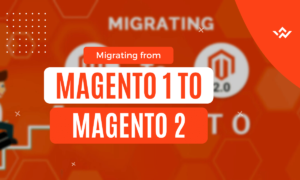What Is WordPress? Beginner’s Guide
WordPress, a content management system (CMS), is employed to establish and control websites. It is based on PHP and MySQL and is known for its ease of use and flexibility. Users can create and publish web pages, blog posts, and more using built-in tools and plugins. As open-source software, it can be utilized and modified free of charge. It is the most popular website-building platform, powering over 40% of all websites on the internet. You can also make a WordPress website with ease.
What are WordPress websites?
WordPress websites are websites that have been built using the content management system (CMS). An open-source platform for building and managing websites with various tools and plugins. WordPress-powered websites using PHP, and MySQL with customizable themes and templates.
WordPress-based websites can serve multiple objectives:
Blogs: It was originally created as a blogging platform, and it remains one of the most popular choices for bloggers today.
Business websites: Many small businesses use WordPress to create professional-looking websites that feature information about products or services, contact forms, and more.
E-commerce websites: By utilizing plugins like WooCommerce, WordPress can be employed to establish online stores.
Portfolio websites: It can be used to create online portfolios for photographers, designers, and other creatives.
Forum websites: Using WordPress and a plugin like bbPress, you can create a forum for discussion on a specific topic.
Membership websites: Using WordPress and a plugin like MemberPress, you can create a website that only allows access to certain content for members.
Non-profit websites: It can be used to create professional-looking websites for non-profit organizations, which can include donation forms, events calendars, and more.
Educational websites: It can be used to create websites for schools, colleges and universities, with features such as course listings, staff directories, and events calendars.
News websites: It can be used to create news websites, with features such as breaking news tickers, multimedia galleries, and more.
These are just a few examples, but with its flexibility and wide range of plugins and themes, it can be used to build almost any type of website.
WordPress Features
There are numerous advantages to utilizing WordPress as a website platform, such as:
Easy to use: User-friendly interface for non-technical users to easily build and manage websites.
Flexibility: Highly customizable with various themes and plugins to improve website functionality.
SEO-friendly: It is optimized for search engines, which can help improve a website’s visibility and rankings in search results.
Community support: An active community of users means ample resources for troubleshooting and customizing.
Affordable: As open-source software, it comes at no cost. This can be a cost-effective option for individuals and small businesses looking to create a website without a large budget.
Mobile-friendly: Its themes are responsive, which means they are designed to adjust to different screen sizes. And also provide an optimal viewing experience on any device.
E-commerce ready: It can be easily integrated with e-commerce platforms like WooCommerce. This makes it possible to create an online store and sell products.
Security: It is regularly updated to address security vulnerabilities, and there are also many security plugins available to protect your site from potential threats.
Multilingual support: There are many plugins available that can help you create a multilingual website, making it accessible to a wider audience.
Social media integration: It allows easy integration with social media platforms, so you can share your content and drive more traffic to your site.
Scalable: It can be used to create small personal blogs, large corporate websites, and everything in between. As your website grows, you can add more features and functionality to keep pace with your changing needs.
Versatile: It can be used to create a wide range of website types, including portfolios, news sites, forums, and more. The platform can be adapted to fit almost any use case.
WordPress.com vs. WordPress.org
WordPress.com and WordPress.org are two different platforms that use the same open-source WordPress software. The main differences between the two are as follows:
Hosting: WordPress.com is a fully hosted platform, which means that your website will be hosted on WordPress.com’s servers. On the other hand, WordPress.org is a self-hosted platform, which means that you’ll need to find a web hosting provider to host your website.
Customization: With WordPress.com, you have limited options for customizing your site. You’ll have access to a limited selection of themes and plugins, and you’ll have to abide by WordPress.com’s terms of service. On the other hand, WordPress.org offers full access to the WordPress repository of themes and plugins, and you have more flexibility with customizing your site.
Cost: WordPress.com offers a free plan, but it has limited features, and you’ll have to pay for additional features and storage. WordPress.org is free to download, but you’ll need to pay for web hosting and domain name.
Ownership: With WordPress.com, you don’t own your website, and your site can be deleted if you violate the terms of service. With WordPress.org, you own your site, and you have full control over it.
In summary, WordPress.com is a great choice for beginners, hobbyists, and those looking for a simple website without a lot of customization. WordPress.org is better for those who want more control over their site. And it’s a good choice for businesses, e-commerce sites, and those who want to monetize their site.
What is a WordPress Plugin?
A WordPress plugin is a software component that adds a specific set of features or functionality to a website. Plugins can be used to add a wide range of functionality to a site, including:
- Contact forms
- Social media integration
- E-commerce functionality
- Security features
- SEO optimization
- Image sliders
- Analytics and tracking
- Custom post types and fields
- And many more.
Plugins are created by third-party developers and can be easily installed and activated on a WordPress site. They can be found in the plugin repository, which is a directory of plugins that are available for free. There are also premium plugins, which are paid plugins that offer additional features and support.
Plugins can be easily managed from the admin area, where you can activate, deactivate, and delete them as needed. It’s important to note that some plugins may have a negative effect on your website’s performance. So it’s a good practice to keep them up to date, and only use the plugins that you really need.
What is a WordPress Theme?
A WordPress theme is a collection of templates and stylesheets that determine the look and layout of a website. A theme controls the visual design elements of a site, including the layout, colors, font styles, and other design elements.
WordPress themes can be found in the theme repository, which is a directory of free themes that are available for download. There are also premium themes, which are paid themes that offer additional features and support.
Themes can be easily installed and activated from the admin area, and most themes come with customizer options that allow you to easily make design changes to your site. Themes can also be customized using CSS, which can be added to the theme’s stylesheet or using a plugin.
It’s important to choose a theme that is responsive. Meaning it’s optimized for different screen sizes and devices and is compatible with the latest version of WordPress. It’s also a good practice to keep your theme updated to ensure that your site remains secure and compatible with the latest version of WordPress.
In summary, themes determine the design and layout of your website and can be easily installed and customized to suit your needs.
How WordPress works?
WordPress is a content management system (CMS) that is built using the PHP programming language and the MySQL database management system. The core software is open-source, which means that it can be freely downloaded and modified by anyone.
Here is a general overview of how WordPress works:
Users install the WordPress software on a web server, which can be a shared hosting account, a virtual private server (VPS), or a dedicated server.
Once installed, users can access the WordPress dashboard, which is the backend interface for managing and creating content on the website.
Users can create pages, posts, and other types of content using a visual editor. These pieces of content are stored in the MySQL database. It can be organized into categories and tags for easy navigation.
WordPress uses templates, called themes, to control the visual layout and design of the website. Users can choose from a wide variety of pre-made themes, or create their own custom themes.
WordPress also uses a variety of plugins to add additional functionality to the website. Plugins can be used for tasks such as creating contact forms, integrating social media, and optimizing the website for search engines.
Once the website is set up. Visitors can access the site’s content by typing in the website’s URL in their web browser. The server then retrieves the content from the MySQL database and renders it in the browser using the active theme.
It also offers APIs for integrating with other platforms and services, such as email marketing platforms, analytics tools, and e-commerce platforms.
what is WordPress hosting?
WordPress hosting refers to the hosting service that is specifically optimized for the WordPress content management system (CMS). WordPress hosting services typically offer auto-updates, pre-installed software, and specialized security for protection from malware and hacking attempts. Some popular WordPress hosting providers include Bluehost, HostGator, and DreamHost.
what is WordPress in digital marketing?
WordPress is a (CMS) that is widely used for creating and managing websites, particularly for blogging and e-commerce. It is an open-source platform, which means that it can be used and customized by anyone for free. In digital marketing, WordPress is often used as a website platform for businesses to create and manage their online presence. It also includes creating and publishing blog posts, creating landing pages for marketing campaigns, and creating e-commerce stores to sell products or services. It’s also used for building SEO & SEM optimized websites and integration with tools such as Google Analytics and email marketing platforms.
How can we make money with WordPress?
There are various methods for generating revenue through a website, such as:
Advertising: You can display ads on your website using ad management plugins, such as Google AdSense, and earn money from clicks or impressions.
Affiliate marketing: You can promote other people’s products or services on your website and earn a commission for each sale or lead generated through your referral.
Sponsored content: You can create sponsored posts or reviews for brands and earn money for each post.
E-commerce: You can set up an online store using a plugin like WooCommerce and sell products directly from your website.
Membership: You can create a membership-based website and charge users a monthly or annual fee for access to exclusive content or features.
Courses and digital products: You can create and sell online courses, ebooks, and other digital products through your website.
Services: Furthermore, you can earn money by offering your skills or expertise as services such as web design, consulting, or writing, and charge clients for it.
Donations: You can add a donation button to your website and accept contributions from your audience.
Earning revenue from a WordPress website requires effort, such as creating valuable content, driving traffic and building relationships with brands and advertisers. Nevertheless, with the right strategy, it can be a great way to monetize your website and earn additional income.
Conclusion
WordPress is a widely used, user-friendly CMS for creating and managing websites, it’s powerful. It is open-source, free to use and can be modified to fit any website’s needs. It offers customization options through its extensive library of plugins and themes, making it user-friendly for non-technical users. Consequently, it has become one of the most popular website-building platforms in the world.


